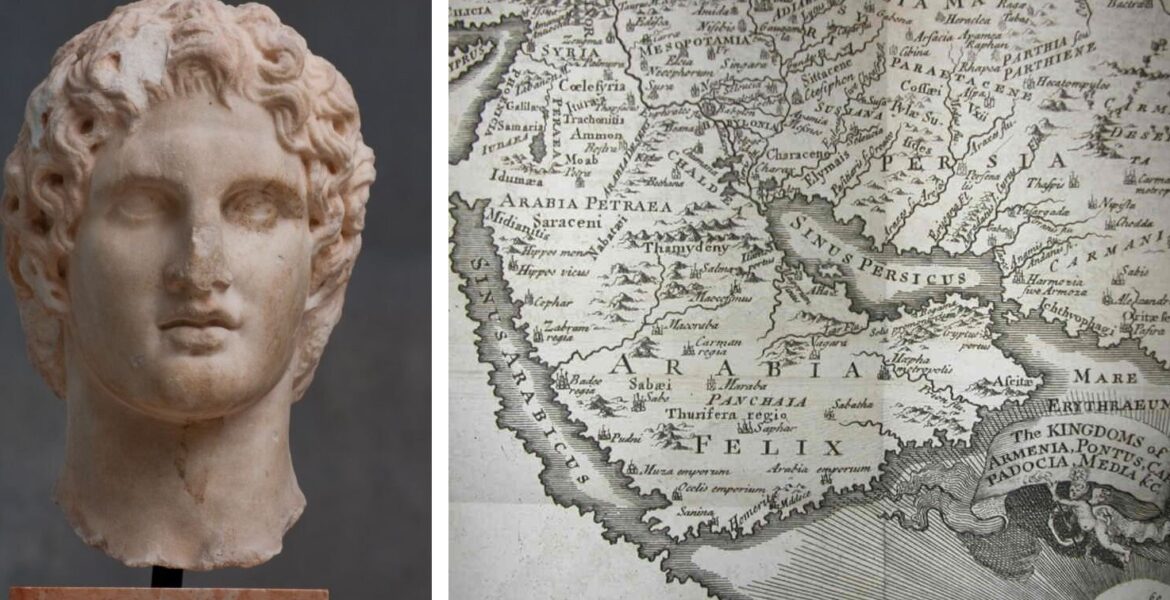Although Alexander the Great began his epic campaign as retribution against the Persians for their occupation of Greek city-states and ambitions against Greece, he became a conquering warlord that reached India.
Although he ultimately died in Babylon after campaigning in India, it is known that he had his eyes set on conquering Arabia.
According to the History of Macedonia, in 324 BC, Alexander the Great sent naval expeditions to survey Arabia in preparation for his planned invasion.
There were meetings with his fleet admiral, Nearchus, whose newly-restored fleet was ready for the next great campaign in Arabia.
Alexander ordered dredging around Babylon to build a proper harbour sufficient to supply 1,000 warships with maintenance facilities and docks.
His days were filled with business, his nights poring over maps and descriptions of unknown islands, far lands, navigational problems, and the advice of subordinates, all in preparation for his conquest of Arabia.
Although his death in 323 B.C. stopped the invasion, the men Alexander sent succeeded in providing the Greeks with detailed information about Arabia.
Some the expedition leaders produced surveys that have come down to us through Greek historians and geographers. From Arrian’s, Anabasis, we know that Alexander built a large harbour in Babylon to prepare for conquering Arabia. Arrian wrote:
“Near Babylon, he constructed a harbour by excavation l enough to afford anchorage for 1,000 war ships; adjoining the harbour, he built dockyards. Miccalus the Clazomenian was dispatched to Phoenicia and Syria with 500 talents to enlist some men and purchase others experienced in nautical affairs… He made these preparations for the fleet to attack the main body of the Arab.”
Arrian explained that Alexander planned to occupy Arabia:
“…under the pretext that they were the only barbarians of this region who had not sent an embassy to him or done anything else, becoming their position and showing respect to him. But the truth was, as it seems, that Alexander was insatiably ambitious to acquire fresh territory.”
Arrian cited other reasons Alexander planned to occupy Arabia: its fertility and the growth of certain plants there. Arrian wrote:
“The fertility of the land was a secret inducement to him to invade it. He had heard that the people obtained cassia from the lakes, myrrh, and frankincense from the trees, that cinnamon was cut from the shrubs, and that the meadows produced spikenard without any cultivation.”
Alexander sent three naval expeditions from Babylon. The first was under Archias, who went as far as the Tylus (Bahrain) island. Aristobulus’ account of the expedition describes the sacred island of Icaros (modern-day Falaika, 20 km off the coast of Kuwait). Also, it informs Arrian’s extensive description of the southern shores of the Persian Gulf.
Archias was followed by Androsthenes of Thasos, who reached the Straits of Hormuz in 423 BC. Androsthenes wrote a book describing his voyage. The book is lost, but his work was a subject of study by later Greek historians and geographers.
The third naval expedition Alexander sent was under Hieron of Soli. Arrian wrote:
“Hieron of Soli, the pilot, also received a triacontor [30-oared ship] from Alexander and advanced farthest of those whom he had despatched to this region; for he had received instructions to sail round the whole Arabian peninsula as far as the Arabian Gulf near Egypt over against Heroopolis. Though he had sailed round the greater part of Arabia, Hieron did not dare go further but turned back to Babylon.”
Hieron’s sailing “round the greater part of Arabia” means he sailed around western Arabia. But he turned back. We suppose the reason Hieron turned back before reaching the Egyptian Gulf opposite to Heroopolis was the arid tract of central western Arabia.
We can understand this from another document in which Arrian wrote about a voyage of Nearchus, who was instructed “to find out what men inhabit it, to discover the harbours and rivers in it, to ascertain the customs of the people, and to see if any of the countries was fertile and if any was sterile.
This was why Alexander’s naval expedition returned in safety; if it had sailed beyond the deserts of Arabia, it would not have returned safely. This is also said to have been why Hieron turned back.”
Arrian tells us that the Greek explorers were explicitly instructed to explore and learn about the inhabitants, their costumes, the fertility of the lands, etc. They had to give a complete picture.
Sailing around Arabia allowed them to gather in-depth information about the lands and the cities that existed in their day. The information they gathered became an important resource for the later Greek explorers of Arabia.
Historical note: The circadian process was first described by one of Alexander’s sea captains, Androsthenes, who observed the diurnal leaf movements of a tamarind tree.
The circadian rhythm is a roughly 24-hour cycle in the physiological processes of living beings. Circadian rhythms are important in determining the sleeping and feeding patterns of all animals, including human beings.
Clear patterns of brain wave activity, hormone production, cell regeneration and other biological activities are linked to this daily cycle.
READ MORE: From Egypt To India: The Cities Founded By Alexander The Great.

